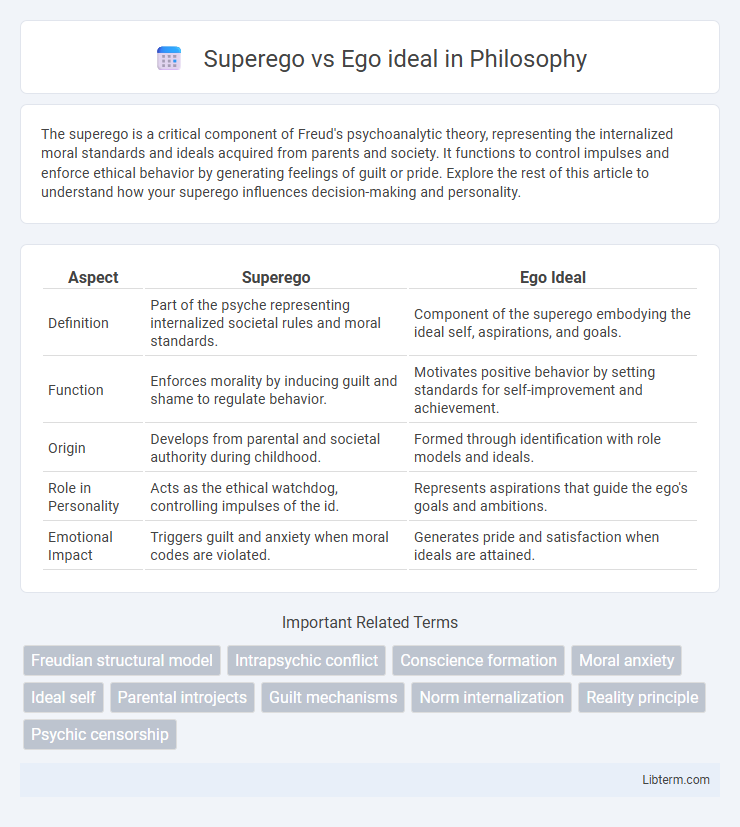The superego is a critical component of Freud's psychoanalytic theory, representing the internalized moral standards and ideals acquired from parents and society. It functions to control impulses and enforce ethical behavior by generating feelings of guilt or pride. Explore the rest of this article to understand how your superego influences decision-making and personality.
Table of Comparison
| Aspect | Superego | Ego Ideal |
|---|---|---|
| Definition | Part of the psyche representing internalized societal rules and moral standards. | Component of the superego embodying the ideal self, aspirations, and goals. |
| Function | Enforces morality by inducing guilt and shame to regulate behavior. | Motivates positive behavior by setting standards for self-improvement and achievement. |
| Origin | Develops from parental and societal authority during childhood. | Formed through identification with role models and ideals. |
| Role in Personality | Acts as the ethical watchdog, controlling impulses of the id. | Represents aspirations that guide the ego's goals and ambitions. |
| Emotional Impact | Triggers guilt and anxiety when moral codes are violated. | Generates pride and satisfaction when ideals are attained. |
Introduction to Superego and Ego Ideal
The superego represents the internalized moral standards and ideals acquired from parents and society, guiding a person's sense of right and wrong. The ego ideal is a component of the superego that embodies specific goals and standards of perfection an individual strives to achieve. Functioning together, the superego enforces ethical conduct while the ego ideal motivates personal growth and self-improvement.
Historical Origins in Psychoanalysis
The Superego and Ego Ideal originate from Sigmund Freud's structural model of the psyche, where the Superego embodies internalized societal and parental standards, enforcing moral judgments and guilt. The Ego Ideal, a component of the Superego, represents the aspirational self-image shaped by idealized values and goals learned during early childhood development. Both concepts highlight the conflict between innate desires and social expectations, forming a foundation for understanding internal psychological tension in psychoanalysis.
Defining the Superego
The Superego is a critical component of Sigmund Freud's psychoanalytic theory, representing the internalized moral standards and ideals acquired from parents and society. It functions to regulate the impulses of the Id by enforcing ethical conduct and striving for perfection, often in conflict with the Ego's reality-based decisions. Unlike the Ego ideal, which consists of aspirational goals and positive self-images, the Superego encompasses both conscience, which induces guilt for wrongdoing, and the ideal self, which motivates adherence to moral norms.
Understanding the Ego Ideal
The ego ideal represents an individual's internalized standards and aspirations derived from parental and societal influences, guiding behavior towards perceived perfection. Unlike the superego, which enforces moral constraints and guilt, the ego ideal motivates positive goals and self-improvement by embodying idealized qualities. Understanding the ego ideal is crucial for comprehending how individuals strive to align their actions with personal and cultural ideals, shaping identity and self-esteem.
Key Differences: Superego vs Ego Ideal
The superego acts as the internalized moral authority, enforcing societal rules and guilt, while the ego ideal represents the aspirational self-image and goals one strives to achieve. The superego punishes deviations from accepted norms through feelings of guilt, whereas the ego ideal rewards compliance with pride and self-satisfaction. Key differences lie in their functions: the superego functions as a critical conscience, and the ego ideal serves as a motivational standard for personal growth.
Functions of the Superego in Personality
The superego functions as the moral compass within personality, enforcing ethical standards and generating feelings of guilt or pride based on behavior alignment with internalized values. It regulates impulses by imposing rules and ideals learned from parents and society, guiding the ego toward socially acceptable actions. The ego ideal component motivates striving toward personal and societal goals, serving as a standard for self-improvement and ambition.
The Role of Ego Ideal in Moral Development
The ego ideal plays a crucial role in moral development by representing internalized standards and aspirations derived from parental and societal expectations. It functions as a guiding framework for behavior, motivating individuals to strive for perfection and moral integrity. Unlike the superego, which enforces guilt and punishment, the ego ideal encourages positive self-evaluation and ethical growth.
Superego and Ego Ideal in Everyday Behavior
The superego functions as the internalized moral authority, regulating behavior through guilt and conscience, while the ego ideal represents the aspirational self-image and standards one strives to achieve. In everyday behavior, the superego enforces rules learned from parents and society, often leading to feelings of pride or guilt depending on compliance. The ego ideal motivates goal-directed actions by embodying the individual's vision of perfection and success.
Psychological Implications and Disorders
The superego and ego ideal play distinct roles in psychological functioning, with the superego acting as a moral watchdog enforcing guilt and shame, while the ego ideal represents internalized aspirations and standards of excellence. Dysregulation between these structures can contribute to disorders such as obsessive-compulsive disorder, anxiety, and depression, where an overactive superego leads to excessive self-criticism or perfectionism. Understanding the dynamic balance between the superego and ego ideal is crucial in psychoanalytic therapy, facilitating healthier self-esteem and reducing maladaptive guilt.
Integrating Superego and Ego Ideal for Well-being
Integrating the superego and ego ideal fosters psychological well-being by balancing internalized moral standards with aspirational self-concepts, enabling individuals to regulate behavior without excessive guilt or unrealistic perfectionism. This harmony promotes healthier self-esteem and adaptive decision-making, reducing anxiety linked to conflicting demands from conscience and idealized self-images. Effective integration supports emotional resilience and personal growth through a unified sense of identity and ethical functioning.
Superego Infographic

 libterm.com
libterm.com